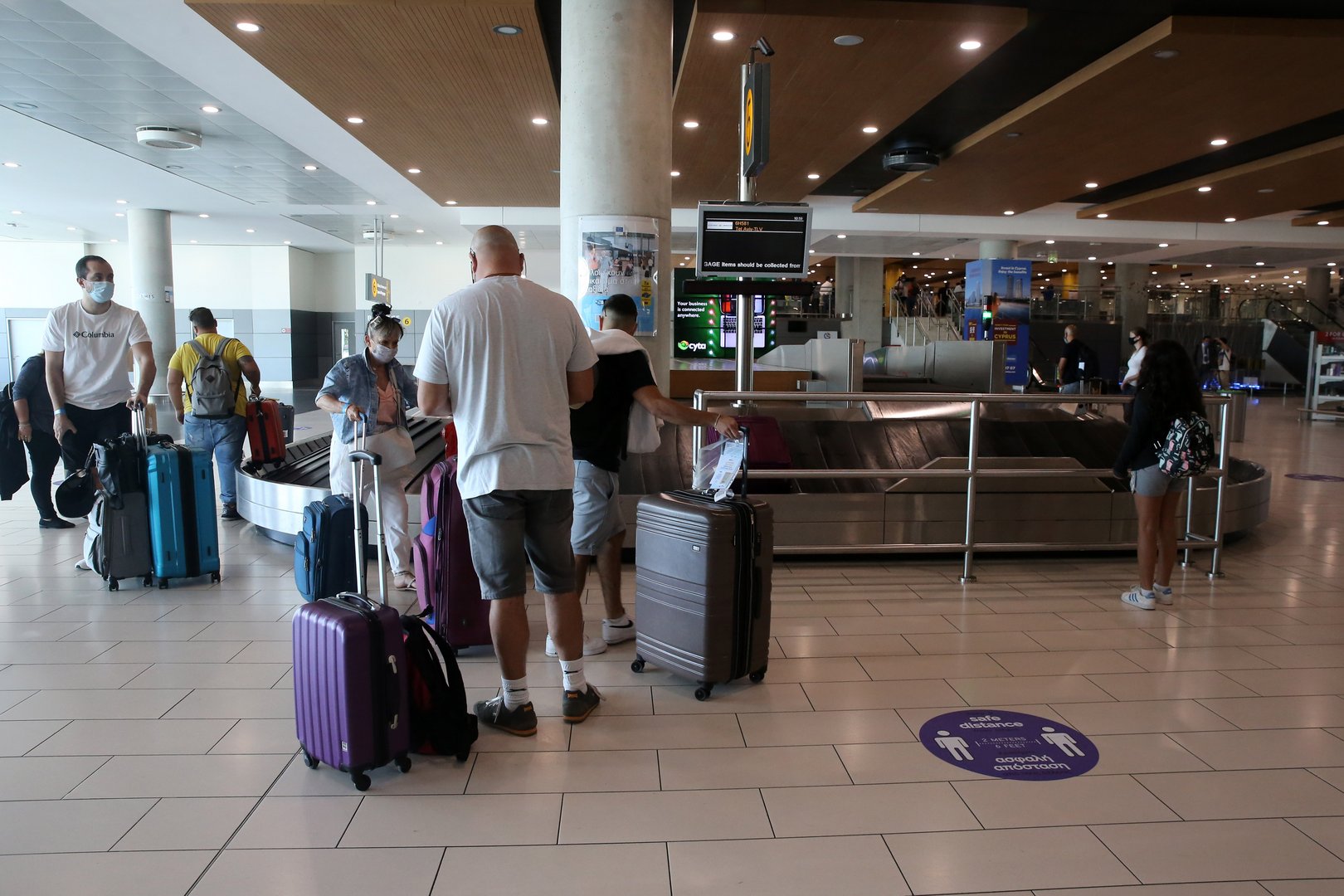By Antigoni Pitta
Grand plans announced by the transport minister for the opening of the island’s airports and optimism expressed by other tourism players earlier this week, began to wane rapidly after the UK government appears set to keep the entire travel industry on tenterhooks until at least April 5.
By Thursday cracks began to show in the confidence expressed earlier by the tourism industry which had the expectation that the island could see British holidaymakers – Cyprus’ main market — return from May 17 and on.
The Paphos Hoteliers Association on Thursday expressed its “intense concern” over report after report coming out of the UK that Brits may not be allowed to travel for leisure for several more months, along with the response by big UK players such as TUI, which announced on the same day that it was scaling back on summer capacity.
Added to that was the imposition of a fine of 5,000 pounds for anyone who tried to leave England without an essential reason.
The new travel fines were included in legislation, passed by the British parliament on Thursday. These will apply until the end of June if the travel ban is not eased after May 17 as had been expected.
Britain currently bans all foreign travel, except for work, education or health reasons. However, the government is to review that in April.
“We’ll be able to say more we hope in a few days’ time. I certainly hope to be saying some more by April the 5th,” Prime Minister Boris Johnson said at a news conference on Tuesday. It had been previously announced that the decision would be made on April 12.
This week’s uncertainty has stamped on the small shoots of optimism that the tourism industry in Cyprus had allowed itself after Britain’s successful vaccination programme had encouraged the deputy ministry for tourism to announce earlier this month that Cyprus would be allowing vaccinated British tourists into the country with no restrictions such as negative Covid tests and having to quarantine, from May 1.
“For people who are going to be travelling here, we wanted to provide certainty that Cyprus is going to be ready to welcome them. Travel planning requires certainty,” deputy tourism minister Savvas Perdios said at the time.
The news was widely reported in British media, with the Times citing travel experts as saying a “wall of money” will be spent on trips to Cyprus. Indeed, despite the uncertainty still looming, a huge surge of holiday bookings to Cyprus was recorded following the announcement, with loveholidays.co.uk reporting an 840 per cent increase in a single week. Moreover, data provided by Jet2holidays showed bookings soared more than 1,000 per cent in 24 hours.
“Confidence was returning, and it was all starting to look good,” Noel Josephides, former chairman of the Association of British Travel Agents (ABTA), told the Sunday Mail. The head of Sunvil Travel, a travel agency specialising in travel to Cyprus, Greece and other European destinations, Josephides explained that in normal times, the company takes around 100 bookings a day this time of year, and last Friday was encouraging as 71 people made bookings.
Then the bad news rolled in, with Mike Tildesley, a scientist on a UK government advisory body saying that holidays abroad are “extremely unlikely” for most Britons this summer due to the risk of importing new variants of Covid-19.
“I think we are running a real risk if we do start to have lots of people going overseas in July, for instance, and August, because of the potential for bringing more of these new variants back into the country,” Tildesley said.
After Tildesley’s statements bookings with Sunvil abruptly stopped, with a measly two bookings recorded on Tuesday. “This is [happening] across the whole industry, and it’s clear to us now that the government is softening us up in order to eventually tell us it’s not going to happen,” Josephides said. This was hinted at by UK Transport Secretary Grant Shapps, who told the BBC last weekend that it was still too early for people to book a foreign summer holiday.
Thursday’s new legislation and the £5,000 fine for those leaving the country without a valid reason added insult to injury.
“It was introduced out of the blue,” according to Josephides, “and unnecessarily, since nobody is travelling anyway.”
Josephides is pessimistic about the taskforce report next month which will reportedly clarify the British government’s decision on foreign travel.
“They insist they will tell us [what will happen] in April, but to put it bluntly, we do not know what’s happening, or what they’re likely to come up with…we just feel like they’ve already made up their minds,” Josephides remarked.
This week’s news was a blow for hoteliers in Cyprus, who were depending on an influx of British tourists to save their businesses. Cyprus hotel association (Pasyxe) director general Philokypros Roussounides told the BBC on Monday that if the travel ban is not lifted, it “will have a huge impact on our financial status as an industry,” specifying that Perdios’ announcement still stands.
“We do not yet know what will happen,” Pasyxe chairman Haris Loizides told the Sunday Mail. “Of course we are worried, but no matter what happens, we are ready to welcome tourists. We’re just hoping the travel ban is lifted sooner rather than later.”
Governments don’t understand how the tourist industry works, Josephides said, going on to explain that there is a roughly two-year-long preparation period going into each tourist season. “We begin to build a picture over that time period and then pass this information on to airlines and hotels,” he said. “Hotels and accommodations are looking to us to update them on how it’s going. Well…. we don’t know what to say.”
Come May 17, or whenever people are allowed to travel again, Josephides said that the travel industry “cannot just switch on holidays”, as a lot of flights may have been cancelled and hotels may not have opened by then. “Already hotels and apartments tell us ‘we don’t think it’s worth opening’,” he added.
At the same time, he stressed that if travel restrictions remain in place for much longer, many companies will lose a lot of the money they may have made, as they would have to issue refunds for thousands of bookings. Loizides agreed, remarking that there is immense pressure on the tourist industry to always be ready, which has created a lot of uncertainty.
Close to 29 million people in the UK have received their first dose of the vaccine, putting it far ahead of the rest of Europe, but the problem lies with the fact that vaccines are not as effective against some variants surging in Europe. Talk of a third wave is rampant, though this is expected to hit Britain less because of its vaccination programme.
The UK government is also expected next month to introduce a risk-based traffic light system, but Health minister Matt Hancock denied the possibility that the whole of Europe will be classified as “red”. However, Josephides’ view is that the UK government would rather keep money in the country than let it be spent in Europe this summer, which is why holidays within the UK are being promoted.
Even though the holiday season is likely to extend well into November, Loizides admitted that hotels are not expecting a lot of guests until July at best. And even if British tourists don’t come rushing in until the end of the summer, the tourist industry can expect visitors from other key markets. On February 14 an agreement was reached with Israel that will allow vaccinated Israeli nationals to travel to the island unrestricted from April 1.
Both Josephides and Loizides remarked that at the end of the day, it all depends on the epidemiological picture in Cyprus. Despite a brief hopeful period of improved epidemiological data, steadily rising infections have put the island in the ECDC’s “dark red” zone. However, the health ministry announced on Monday that with upcoming vaccine deliveries, vulnerable groups and everyone aged 45 and over will receive their first jab by the first week of May, which will hopefully lead to an improvement in the data.
“I don’t know what to say,” Josephides exclaimed. “I can usually read the situation fairly well, but this is ridiculous. Everything’s come to a stop.”
The doom and gloom was shared by tour operator TUI on Thursday when it touched the brakes on its summer holiday plans, lowering capacity for July onwards to 75 per cent of 2019’s level from 80 per cent previously.
But in typical fashion, Ryanair’s Group chief executive Michael O’Leary presented a more optimistic view of the near future on Wednesday, telling Sky News that in three months’ time, when more people had been vaccinated, the picture across Europe will look different.
“We’re reasonably confident that there will be unrestricted holiday travel for British families going to European beach resorts,” he said.
The Cyprus tourism industry, meanwhile, is holding its breath.









Click here to change your cookie preferences